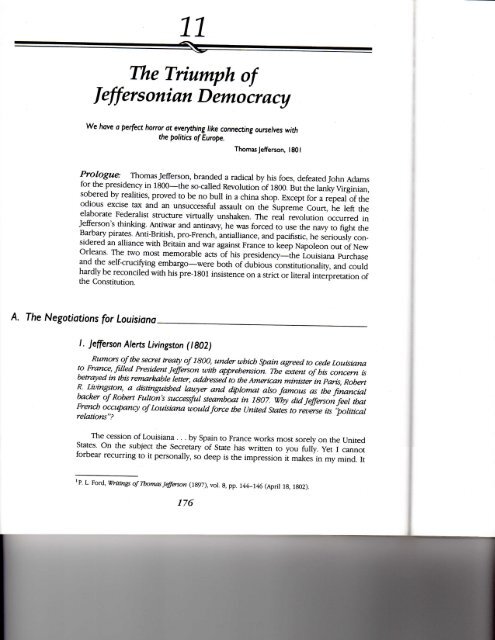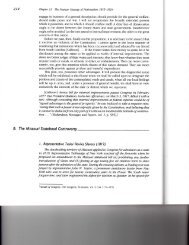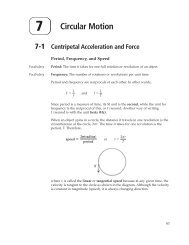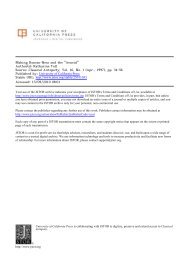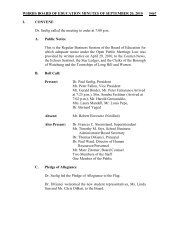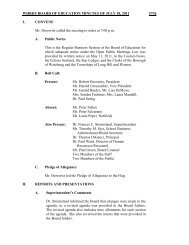Louisiana Purchase Primary Source Packet
Louisiana Purchase Primary Source Packet
Louisiana Purchase Primary Source Packet
Create successful ePaper yourself
Turn your PDF publications into a flip-book with our unique Google optimized e-Paper software.
11<br />
The Triumph of<br />
Jeffersonian Democracy<br />
We have a perfect horror at everything like conriecting ourselves w/'th<br />
the politics of Europe.<br />
Thomas Jefferson, 1801<br />
Prologue: Thomas Jefferson, branded a radical by his foes, defeated John Adams<br />
for the presidency in 1800—the so-called Revolution of 1800. But the lanky Virginian,<br />
sobered by realities, proved to be no bull in a china shop. Except for a repeal of the<br />
odious excise tax and an unsuccessful assault on the Supreme Court, he left the<br />
elaborate Federalist structure virtually unshaken. The real revolution occurred in<br />
Jefferson's thinking. Antiwar and antinavy, he was forced to use the navy to fight the<br />
Barbary pirates. Anti-British, pro-French, antialliance, and pacifistic, he seriously considered<br />
an alliance with Britain and war against France to keep Napoleon out of New<br />
Orleans. The two most memorable acts of his presidency—the <strong>Louisiana</strong> <strong>Purchase</strong><br />
and the self-crucifying embargo—were both of dubious constitutionality, and could<br />
hardly be reconciled with his pre-1801 insistence on a strict or literal interpretation of<br />
the Constitution.<br />
A. The Negotiations for <strong>Louisiana</strong><br />
/. Jeffersor) Alerts LiYir)gston (1802)<br />
Rumors of the secret treaty of 1800, under which Spain agreed to cede <strong>Louisiana</strong><br />
to France, filled [Resident Jefferson with apprehension. The extent of his concern is<br />
betrayed in this remarkable letter, addressed to the American minister in Paris, Robert<br />
R. Livingston, a distinguished lawyer and diplomat also famous as the financial<br />
backer of Robert Fulton's successful steamboat in 1807. Why did Jefferson feel that<br />
French occupancy of <strong>Louisiana</strong> would force the United States to reverse its 'political<br />
relations"?<br />
The cession of <strong>Louisiana</strong> ... by Spain to France works most sorely on the United<br />
States. On the subject the Secretary of State has written to you fully. Yet I cannot<br />
forbear recurring to it personally, so deep is the impression it makes in my mind. It<br />
'p. L. Ford, Writing of Thomas Jefferson (1897), vol. 8, pp. 144-146 (April 18, 1802).<br />
176
A The Negotiations for <strong>Louisiana</strong> 177<br />
completely reverses all the political relations of the United States and will form a new<br />
epoch in our political course.<br />
Of all nations of any consideration, France is the one which hitherto has offered<br />
the fewest points on which we could have any conflict of right, and the most points of<br />
a communion of interests. From these causes we have ever looked to her as our<br />
natural friend, as one with which we never could have an occasion of difference.* Her<br />
growth therefore we viewed as our own, her misfortunes ours.<br />
There is on the globe one single spot, the possessor of which is our natural and<br />
habitual enemy. It is New Orleans, through which the produce of three-eighths of our<br />
territory' must pass to market, and from its fertility' it will ere long yield more than half<br />
of our whole produce and contain more than half our inhabitants. France, placing<br />
herself in that door, assumes to us the attitude of defiance.<br />
Spain might have retained it quietly for years. Her pacific dispositions, her feeble<br />
state, would induce her to increase our facilities there, so that her possession of the<br />
place would be hardly felt by us. And it would not perhaps be ver^^ long before some<br />
circumstances might arise which might make the cession of it to us the price of<br />
something of more worth to her.<br />
Not so can it ever be in the hands of France. The impetuosit)' of her temper, the<br />
energ\ and restlessness of her character. . . render it impossible that France and the<br />
United States can continue long friends when they meet in so irritable a position.<br />
They, as well as we, must be blind if they do not see this; and we must be very<br />
improvident if we do not begin to make arrangements on that hypothesis.<br />
The day that France takes possession of New Orleans fixes the sentence which is<br />
to restrain her forever within her low-water mark. It seals the union of two nations<br />
who in conjunction can maintain exclusive possession of the ocean. From that moment<br />
we must marr\ ourselves to the British fleet and nation. We must turn all our<br />
attentions to a maritime force, for which our resources place us on veq' high grounds;<br />
and having formed and cemented together a power which may render reinforcement<br />
of her settlements here impossible to France, make the first cannon which shall be<br />
fired in Europe the signal for tearing up any settlement she may have made, and for<br />
holding the two continents of America in sequestration for the common purposes of<br />
the united British and American nations.<br />
This is not a state of things we seek or desire. It is one which this measure, if<br />
adopted by France, forces on us, as necessarily as any other cause, by the laws of<br />
nature, brings on its necessar>' effect. It is not from a fear of France that we deprecate<br />
this measure proposed by her. For however greater her force is than ours compared<br />
in the abstract, it is nothing in comparison of ours when to be exerted on our soil. But<br />
it is from a sincere love of peace, and a firm persuasion that, bound to France by the<br />
interests and the strong sympathies still existing in the minds of our citizens, and<br />
holding relative positions which ensure their continuance, we are secure of a long<br />
course of peace. Whereas the change of friends, which will be rendered necessan' if<br />
France changes that position, embarks us necessarily as a belligerent power in the first<br />
war of Europe. In that case, France will have held possession of New Orleans during<br />
the interval of a peace, long or short, at the end of which it will be wrested from<br />
her. ...<br />
'Jefferson conveniently overlooked the undeclared naval war of 1798-1800.
178 Chapter 11 The Triumph of Jeffersonian Democracy'<br />
She may say she needs <strong>Louisiana</strong> for the supply of her West Indies. She does not<br />
need it in time of peace. And in war she could not depend on them because they<br />
would be so easily intercepted [by the British navy], . . .<br />
If France considers <strong>Louisiana</strong>, however, as indispensable for her views, she might<br />
perhaps be willing to look about for arrangements which might reconcile it to our<br />
interests. If anything could do this, it would be the ceding to us the Island of New<br />
Orleans and the Floridas. This would certainly in a great degree remove the causes of<br />
jarring and irritation between us, and perhaps for such a length of time as might<br />
produce other means of making the measure permanently conciliator)' to our interests<br />
and friendships.<br />
2. Napoleon Conceals His Motives (1803)<br />
In 1802 the Spanish officials in New Orleans suddenly withdrew the right of<br />
deposit or storage, so essential to Ainerican down-river commerce, without naming<br />
another place, as required by the Treat)' of 1795. Seeking to calm the hair-trigger<br />
westerners by eliminating such restrictions, fefferson dispatched fames Monroe to<br />
Paris to assist Minister Livingston. The two envoys were instructed to pay up to $10<br />
million for New Orleans and as much land to the east in the Floridas as the)' could<br />
obtain. If Prance then proposed to close the Mississippi or seemed to "meditate hostilities,<br />
" Monroe and Livingston were to seek an alliance with Britain. Napoleon, for<br />
purely realistic reasons, had meanwhile decided to sell all of <strong>Louisiana</strong>. He had failed<br />
disastrously in his efforts to reconquer the sugar-rich colony of Santo Domingo from<br />
the rebellious blacks, and he valued Louisiaria primarily as a feeder for this colony. He<br />
was about to reopen war with the British, who could speedily capture <strong>Louisiana</strong> with<br />
their might)' fleet. If he sold the territor)' to the A?nericans for $15 million, he would<br />
strengthen his short-run position and build up a long-run rival of Britain in North<br />
America. His motives, as expressed to Monroe, do not square with all the facts. What is<br />
?nost improbable about Napoleon's version as reported b)' Monroe?<br />
... I [Monroe] added that it was the wish of the President that I should assure him<br />
[Napoleon] before my departure of his high respect and esteem for him personally<br />
and for the French nation, and of his earnest desire to presence peace and friendship<br />
with it.<br />
The First Consul [Napoleon] reciprocated the sentiment toward the President and<br />
the United States in strong terms. He said that he considered the President as a<br />
virtuous and enlightened man, who understood and pursued the interest of his country',<br />
as a friend of liberty and equality; that no one wished more than himself the<br />
preservation of a good understanding between tlie two republics; that he had been<br />
prompted to make the late cession to the United States not so much on account of the<br />
sum given for the territory as from views of policy; that France had been their first<br />
friend and he wished to preserve that relation bet^\'een the two countries for ever. He<br />
had perceived that we entertained a jealousy of their possession of <strong>Louisiana</strong> which<br />
was likely to drive us into measures and connections [with Britain] that would prove<br />
^S. M. Hamilton, ed., Writings of Jam.esMonroe (New York and London: G. P. Putnam's Sons, ]900), vol, 4,<br />
pp. 48-49.
A The Negotiations for <strong>Louisiana</strong> 179<br />
not only hurtful to France but, as he presumed, to ourselves also. He therefore wished<br />
to remove the cause by an act which would free us from all apprehension on that<br />
head, and leave us at libert\ to pursue our course according to our interest and<br />
inclination.<br />
I told him in reply that I had considered the cession of <strong>Louisiana</strong> as having been<br />
prompted by the motives which he stated, as being an act of great and enlightened<br />
policy rather than an affair of commerce, and was persuaded that our government<br />
would view it in the same light; that the cession would place us on the ground he<br />
mentioned of real independence; that we had, however, been willing to give what was<br />
deemed an equivalent for it.<br />
He obser\'ed that there was no rivalship betv.'een us, our relation to France being<br />
chiefly commercial; but that we must be on our guard not to give the protection of our<br />
flag to the British.<br />
3. Hamilton Lukewarmly Backs Jefferson (1803)<br />
The loose constructionist Alexander Hamilton, destined to die in a duel a year<br />
later, could not have been altogether displeased by fefferson's sudden conversion from<br />
supporting a strict construction of the Constitution to advocating a loose construction.<br />
Then a prominent New York attorney, Hamilton prepared the following newspaper<br />
editorial in which be deplored the acquistion of the vast trans-Mississippi wilderness<br />
as unnecessaty and as likely to cause the eventual dismemberment of the Union b)><br />
diffusing the population too widely. In what ways did subsequent events confinn or<br />
disprove bis views?<br />
At length the business of New Orleans has terminated favorably to this country',<br />
histead of being obliged to rely any longer on the force of treaties for a place of<br />
deposit, the jurisdiction of the territory is now transferred to our hands, and in future<br />
the navigation of the Mississippi will be ours unmolested. This, it will be allowed, is an<br />
important acquisition; not, indeed, as territory, but as being essential to the peace and<br />
prosperit\ of our Western countr)', and as opening a free and valuable market to our<br />
commercial states.<br />
This purchase has been made during the period of Mr. Jefferson's president', and<br />
will, doubtless, give eclat to his administration. Ever)' man, however, possessed of the<br />
least candor and reflection will readily acknowledge that the acquisition has been<br />
solely owing to a fortuitous concurrence of unforeseen and unexpected circumstances,<br />
and not to any wise or vigorous measures on the part of the American<br />
government. . . .<br />
As soon as we experienced from Spain a direct infraction of an important article<br />
of our treat)' [of 1795], in withholding the deposit of New Orleans, it afforded us<br />
justifiable cause of war, and authorized immediate hostilities. Sound poliq' unquestionably<br />
demanded of us to begin with a prompt, bold, and vigorous resistance against<br />
the injustice; to seize the object at once. And having this vantage ground, should we<br />
'"Hamilton on the LouLsiana <strong>Purchase</strong>: A Newly Identified Editorial from the Neiv York Evening Post,"<br />
William and Mary Quarterly, Third Series, vol. 12 (1955), pp. 273-276, passim.
Chester 11 The Triumph of Jeffersonian Democracy<br />
have thought it advisable to terminate hostilities by a purchase, we might then have<br />
done it on almost our own terms. This course, however, was not adopted. . . .<br />
On the part of France, the short interval of peace had been wasted in repeated and<br />
fruitless efforts to subjugate Santo Domingo; and those means which were originally<br />
destined to the colonization of <strong>Louisiana</strong> had been gradually exhausted by the unexpected<br />
difficulties of this ill-starred enterprise. To the deadly climate of Santo<br />
Domingo, and to the courage and obstinate resistance made by its black inhabitants,<br />
are we indebted for the obstacles which delayed the colonization of <strong>Louisiana</strong> till the<br />
auspicious moment when a [prospective] rupture between England and France gave a<br />
new turn to the projects of the latter, and destroyed at once all her schemes as to this<br />
favorite object of her ambition.<br />
It was made known to Bonaparte that among the first objects of England would be<br />
the seizure of New Orleans, and that preparations were even then in a state of<br />
forwardness for that purpose. The First Consul could not doubt that, if an English fleet<br />
was sent thither, the place must fall without resistance. It was obvious, therefore, that it<br />
would be in ever^' shape preferable that it should be placed in the possession of a<br />
neutral power. And when, besides, some millions of money, of which he was extremely<br />
in want, were offered him to part with what he could no longer hold, it affords<br />
a moral certainty that it was to an accidental state of circumstances, and not to wise<br />
plans, that this cession, at this time, has been owing. We shall venture to add that<br />
neither of the ministers through whose instrumentality it was effected will ever deny<br />
this, or even pretend that, previous to the time when a rupture was believed to be<br />
inevitable, there was the smallest chance of inducing the First Consul, with his ambitious<br />
and aggrandizing views, to commute the territory' for any sum of money in their<br />
power to offer.<br />
The real truth is, Bonaparte found himself absolutely compelled, by situation, to<br />
relinquish his darling plan of colonizing the banks of the Mississippi. And thus have<br />
the government of the United States, by the unforseen operation of events, gained<br />
what the feebleness and pusillanimity' of its miserable system of measures could never<br />
have acquired. . . .<br />
Those disposed to magnify its [<strong>Louisiana</strong>'s] value will say that this Western region<br />
is important as keeping off a troublesome neighbor, and leaving us in the quiet<br />
possession of the Mississippi. Undoubtedly this has some force, but, on the other<br />
hand, it may be said that the acquisition of New Orleans is perfectly adequate to every<br />
purpose. For whoever is in possession of that, has the uncontrolled command of the<br />
river.<br />
Again, it may be said, and this probably is the most favorable point of view in<br />
which it can be placed, that although not valuable to the United States for settlement, it<br />
is so to Spain, and will become more so, and therefore at some distant period will<br />
form an object which we may barter with her for the Floridas, obviously of far greater<br />
value to us than all the immense, undefined region west of the river. . . .<br />
. . . When we consider the present extent of the United States, and that not one<br />
sixteenth part of its territory is yet under occupation, the advantage of the acquisition,<br />
as it relates to actual settlement, appears too distant and remote to strike the mind of a<br />
sober politician with much force. This, therefore, can only rest in speculation for many<br />
years, if not centuries to come, and consequently will not perhaps be allowed very<br />
great weight in the account by the majority of readers.<br />
)<br />
/
B. The Approval of the <strong>Purchase</strong><br />
181<br />
But it may be added that, should our own citizens, more enterprising than wise,<br />
become desirous of setding this country, and emigrate thither, it must not only be<br />
attended with all the injuries of a too widely dispersed population, but by adding to<br />
the great weight of the western part of our territor>', must hasten the dismemberment<br />
of a large portion of our country', or a dissolution of the government. On the whole,<br />
we think it may with candor be said that whether the possession at this time of any<br />
territory west of the river Mississippi will be advantageous, is at best extremely problematical.<br />
6. The Approval of the <strong>Purchase</strong><br />
/. Jefferson Favors an Unconstitutional Act (1803)<br />
Jefferson, in opposing Hamilton's Bank, had argued (see p. 154) that powers not<br />
conferred on the central government were reserved to the states. The Constitution did<br />
not specifically empower the president and Congress to annex foreign territory, especially<br />
territory as large as the nation itself, and incorporate its fift}' thousand or so<br />
multicolored inhabitants into the Union as citizens. Jefferson hastily drafted proposals<br />
for a constitutional amendment, but since time pressed and the bargain was breathtaking,<br />
he finally pigeonholed them. (In 1828 Supreme Court upheld the acquisition<br />
of territory under the war- and treaty-m^ing clauses of the Constitution.) In<br />
Jefferson's letter to Senate leader John Breckinridge, is the guardian analogy sound?<br />
This treaty must, of course, be laid before both Houses, because both have<br />
important functions to exercise respecting it. They, 1 presume, will see their duty to<br />
their country in ratifying and paying for it, so as to secure a good which would<br />
otherwise probably be never again in their power. But I suppose they must then<br />
appeal to the nation for an additional article [amendment] to the Constitution, approving<br />
and confirming an act which the nation had not previously authorized.<br />
The Constitution has made no provision for our holding foreign territory', still less<br />
for incorporating foreign nations into our Union. The Executive, in seizing the fugitive<br />
occurrence which so much advances the good of their country', have done an act<br />
beyond the Constitution. The Legislature, in casting behind tliem metaphysical subdeties,<br />
and risking themselves like faithful servants, must ratify and pay for it, and<br />
throw themselves on their country for doing for them, unauthorized, what we know<br />
they would have done for themselves had they been in a situadon to do it.<br />
It is the case of a guardian, invesung the money of his ward in purchasing an<br />
important adjacent territory'; and saying to him when of age, "I did this for your good. I<br />
pretend to no right to bind you: you may disavow me, and I must get out of the scrape<br />
as I can. I thought it my duty to risk myself for you."<br />
But we shall not be disavowed by the nation, and their act of indemnity will<br />
confirm and not weaken the Constitution, by more strongly marking out its lines.<br />
'A. A. Lipscomb, ed., Writings of Thomas Jefferson (Washington, D.C.: Thomas Jefferson Memorial Association,<br />
1904), vol. 10, pp. 410-411 (August 12, 1803).
182 Chapter 11 The Triumph of Jeffersonian Democracy<br />
2. Representative Griswold Is Unhappy (1803)<br />
fefferson summoned Congress into special session because the Senate had to<br />
approve the <strong>Louisiana</strong> <strong>Purchase</strong> t)-eaties, and the House and Senate had to vote the<br />
money. The New England Federalists fought the acquisition, largely because "the<br />
mixed race of Anglo Hispano-Gallo-Americans" would ultimately outvote the charter-member<br />
states of the Union and, the^'feared, cause its dismemberment. Representative<br />
Griswold of Connecticut, perhaps the ablest Federalist spokesman in the House,<br />
had already attained notoriety in 1798 by> caning Representative Lyon after the latter<br />
had spat in his face. On tvhat terms would Griswold, in the folloiving speech, have<br />
accepted <strong>Louisiana</strong>?<br />
It is, in my opinion, scarcely possible for any gentleman on this floor to advance<br />
an opinion that the President and Senate may add to the members of the Union by<br />
treat}' whenever they please, or, in the words of this treat)', may "incorporate in the<br />
union of the United States" a foreign nation who, from interest or ambition, may wish<br />
to become a member of our government. Such a power would be directly repugnant<br />
to the original compact betvi'een the states, and a violation of the principles on which<br />
that compact was formed.<br />
It has been already well obsen'ed that the union of the states was formed on the<br />
principle of a co-partnership, and it would be absurd to suppose that the agents of the<br />
parties who have been appointed to execute the business of the compact, in behalf of<br />
the principals, could admit of a new partner without the consent of the parties themselves.<br />
. . .<br />
The incorporation of a foreign nation into the Union, so far from tending to<br />
preserve the Union, is a direct inroad upon it. It destroys the perfect union contemplated<br />
between the original parties, by interposing an alien and a stranger to share the<br />
powers of government with them. ...<br />
A gentleman from Pennsylvania, however (Mr. Smilie), has said that it is competent<br />
for this government to obtain a new territory' by conquest, and if a new territory<br />
can be obtained by conquest, he infers that it can be procured in the manner provided<br />
for by the treat)'.<br />
While I admit the premises of the gentleman from Pennsylvania, I deny his<br />
conclusion. A new territor>' and new subjects may undoubtedly be obtained by conquest<br />
and by purchase; but neither the conquest nor the purchase can incorporate<br />
them into the Union. They must remain in the condition of colonies, and be governed<br />
accordingly. The objection to the third article is not that the province of <strong>Louisiana</strong><br />
could not have been purchased, but that neither this nor any other foreign nation can<br />
be incorporated into the Union by treaty or by a law. And as this country' has been<br />
ceded to the United States only under the condition of an incorporation, it results<br />
that, if the condition is unconstitutional or impossible, the cession itself falls to the<br />
ground. . . .<br />
This subject was much considered during the last session of Congress, but it will<br />
not be found ... that any individual entenained the least wish to obtain the province of<br />
<strong>Louisiana</strong>. Our views were then confined to New Orleans and the Floridas, and, in my<br />
^Annals of Congress, 8th Congress, 1st session, vol. 1, cols. 461-462, 463, 465.
B. Tlx Approval of the <strong>Purchase</strong> 183<br />
judgment, it would have been happy for the countiy if they were still confined within<br />
those limits. The vast and unmanageable extent which the accession of <strong>Louisiana</strong> will<br />
give to the United States; the consequent dispersion of our population; and the<br />
destruction of that balance which it is so important to maintain between the Eastern<br />
and the Western states, threatens, at no ver^' distant day, the subversion of our Union.<br />
3. Senator Breckinridge Supports the <strong>Purchase</strong> (1803)<br />
Virginia-bom Senator John Breckinridge of Ke^ttuck}', then the ablest spokesman<br />
for the West, had spomored Jefferson's secretly prepared Kentucky! resolutions of<br />
1798-1799 in his state legislature. Alert both to tvestern interests aitd to partisan<br />
politics, he urged the <strong>Louisiana</strong> <strong>Purchase</strong> in this notewonhy speech. He took shaip<br />
issue with the Federalist senators, including Seitator White of Delaware, ivho held that<br />
<strong>Louisiana</strong> would "be the greatest curse that could at presei%t befall us. ..." Breckinridge<br />
noted particularly the disagreement of the Fedei'alists among themselves conce}~ni7ig<br />
the extravagance of the price, the validity of the title, and the unconstitutionalit)!<br />
of acquiring foreign ten'itoiy. He then launched into his argument, as follows. How<br />
effectively did he meet the Fedei'alist objections, especially with I'eference to the problem<br />
of the westerne)-s?<br />
As to the enormit\ of price, I would ask that gendeman [Senator White], would his<br />
mode of acquiring it [by war] through 50,000 men have cost nothing? Is he so<br />
confident of this as to be able to pronounce positively tliat the price is enormous?<br />
Does he make no calculation on the hazard attending this conflict? Is he sure the God<br />
of battles was enlisted on his side? Were France and Spain, under the auspices of<br />
Bonaparte, contemptible adversaries? Good as the cause was, and great as my<br />
confidence is in the courage of my countr^'men, sure 1 am that I shall never regret, as<br />
the gentleman seems to do, that the experiment was not made. . . .<br />
To acquire an empire of perhaps half [once again] the extent of the one we<br />
possessed, from the most powerful and v>'arlike nation on earth, without bloodshed,<br />
without tlie oppression of a single individual, without in the least embarrassing the<br />
ordinan' operations of your finances, and all this through the peaceful forms of<br />
negotiation, and in despite too of the opposition of a considerable portion of the<br />
communit)', is an achievement of which the archives of the predecessors, at least, of<br />
those now in office cannot furnish a parallel.<br />
The same gentleman has told us, that this acquisition will, from its extent, soon<br />
prove destructive to the confederal' [Union]. . . .<br />
So far from believing in the doctrine that a republic ought to be confined within<br />
narrow limits, I believe, on the contrar)-, that the more extensive its dominion the<br />
more safe and more durable it will be. hi proportion to the number of hands you<br />
entrust the precious blessings of a free government to, in the same proportion do you<br />
multiply the chances for their preservation. I entertain, therefore, no fears for the<br />
confederaq' on account of its extent. . . .<br />
The gentlemen from Delaware [White] and Massachusetts [Pickering] both contend<br />
that the third article of the treat)' is unconstitutional, and our consent to its<br />
'Ammls of Congress, 8th Congress, 1st session, vol. 1, cols. 60-62, 65.
184 Chapter 11 The Triumph of Jeffersonian Democracy<br />
ratification a nullity, because the United States cannot acquire foreign territory. . . .<br />
Cannot the Constitution be so amended (if it should be necessary) as to embrace this<br />
territory? If the authority to acquire foreign territory be not included in the treatymaking<br />
power, it remains with the people; and in that way all the doubts and<br />
difficulties of gentlemen may be completely removed; and that, too, without affording<br />
France the smallest ground of exception to the literal execution on our part of that<br />
article of the treaty. . . .<br />
What palliation can we offer to our Western citizens for a conduct like this? Will<br />
they be content with the redefined and metaphysical reasonings and constructions<br />
upon which gentlemen have bottomed their opposition today? Will it be satisfactory' to<br />
them to be told that the title is good, the price low, the finances competent, and the<br />
authority, at least to purchase, constitutional; but that the country is too extensive, and<br />
that the admission of these people to all the privileges we ourselves enjoy is not<br />
permitted by the Constitution? It will not, sir.<br />
4. Lew/s and Clark Meet a Grizzly (1805)<br />
Diplomacy done, the vast and uncharted wilderness that was the <strong>Louisiana</strong> territory<br />
remained to be explored. President Jefferson commissioned Meriwether Lewis and<br />
William Clark for the Job, which took two years. The Lewis and Clark party of thirtyfour<br />
soldiers and ten civilians moved up the Missouri River from St Louis in the<br />
autumn of 1804, wintered with the Mandan Indians in present-day North Dakota,<br />
and struck out for the Pacific Ocean again in the spring of 1805- They sighted the<br />
Pacific in November 1805 and eventually returned to St. Louis nearly a year later.<br />
Along the way they collected botanical and geological specimens and made preliminary<br />
maps of the country. They also had numerous adventures, such as this one,<br />
recounted in Lewis's diary, which took place in present-day eastern Montana. What<br />
does it suggest about the task of taming the nearly trackless territory Jefferson had<br />
acquired?<br />
Tuesday May I4th 1805.<br />
Some fog on the river this morning, which is a very rare occurrence; the country much<br />
as it was yesterday with this difference that the bottoms are somewhat wider; passed<br />
some high black bluffs. Saw immence herds of buffaloe today also Elk deer wolves and<br />
Antelopes. Passed three large creeks one on the Starboard and two others on the<br />
Larboard side, neither of which had any runing water. Capt Clark walked on shore and<br />
killed a very fine buffaloe cow. I felt an inclination to eat some veal and walked on<br />
shore and killed a very fine buffaloe calf and a large woolf, much the whitest I had<br />
seen, it was quite as white as the wool of the common sheep. One of the party<br />
wounded a brown bear very badly, but being alone did not think proper to pursue<br />
him. In the evening the men in two of the rear canoes discovered a large brown bear<br />
•'Reuben Gold Thwaites, ed., Original Journals of the Lewis and Clark Expedition, 1804-1806 (Washington,<br />
D.C.: Government Printing Office, 1904), vol. 2, pp. 33-34.


